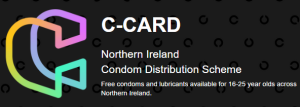
Using condoms is an important part of looking after your sexual health if you are sexually active.
Condoms are the only method of contraception that can help protect against both pregnancy and STIs.
Condoms help protect you from STIs during oral, vaginal and anal sex. You should always use a condom when having sex with casual and new partners.
You can get free condoms from a number of places, including genitourinary medicine (GUM) clinics, sexual healthcare services and through the condom distribution (C-Card) scheme.
-
How to use it?
- Always use a new condom, check the use by date and check if it is not damaged.
- Take the condom out of the pack carefully. Do not use your teeth and watch out for rings and sharp fingernails that can tear the condom.
- Wait until the penis gets hard before putting on the condom.
- Put on the condom before any intercourse or genital contact.
- Unroll the condom a bit to check that it’s the right way round before putting it near the erect penis.
- You should squeeze the tip of the condom to get rid of any air.
- Place the condom over the tip of the hard penis and roll it all the way down to the base of the penis.
- If you’re using a water-based lubricant, spread it over the outside of the condom when it is on the penis.
- Use plenty of condom friendly lubrication for anal sex – oil-based lubricants (Vaseline, baby oil) can cause damage to latex condoms.
- You should always check during sex that the condom hasn’t slipped off.
- After sex, withdraw carefully while the penis is still hard. Hold the condom at the base when you pull out, to stop it from slipping off.
- Remove carefully and keep the semen in condom.
- Wrap the condom in a tissue and dispose of it carefully in a bin, not down the toilet.
- Always use a new condom if you have sex again.
-
Advantages
- If used correctly, provide contraception and protection against pregnancy.
- Condoms are important. When used properly, they can help to protect against sexually transmitted infections, HIV and unplanned pregnancy.
- Condoms are widely available for sale without a prescription.
- Allows both partners to take responsibility for contraception
- Condoms can be used with other methods of contraception to practise safer sex and prevent unplanned pregnancies and STIs.
- They can help to protect both partners from sexually transmitted infections, including HIV.
- They have no medical side effects.
- They are useful if you want to avoid taking hormones.
- A dam (a square of very soft, thin plastic) placed across the anus or female genitals can be used to protect against infection through oral sex.
-
Disadvantages
- Putting a condom on correctly needs practice.
- Taking one out will need practice. You must hold the base of the penis when withdrawing after sex to stop the condom from slipping.
- Condoms can get damaged if handled roughly or used with an oil-based lubricant like Vaseline.
- Must be used before the expiry date on the packet.
-
C-Card scheme for young people (free condoms and lubricants)
Condoms and lubricants are available for free for young people aged 16-25 years. The C-Card initiative aims to ensure that young people are safe and informed when it comes to their sexual health and have all the practical support they need.
What is C-Card?

The C-Card (Condom Distribution) scheme is a confidential sexual health service for young people aged 16 – 25 years in Northern Ireland. The scheme provides free condoms, lubricants, information support and advice at convenient times and in a variety of locations across local communities.
What happens when you attend a local C-Card provider?
- Registration: when you attend one of the local C-Card provider sites you will be registered for a C-Card. This includes being shown how to use a condom.
- Issue: once the C-Card is issued, you are entitled to an agreed number of free supplies from any participating Registration Site. Packs generally contain six to ten condoms, a supply of lubricant, written instructions, and details of local sexual and reproductive health services.
- Review: after receiving supplies an agreed number of times, the young person must return to a Registration Site where their sexual health circumstances will be reviewed.
BELFAST (BHSCT)
Doyle Youth Club
29 Mountpottinger Road
Belfast BT5 4LA
Email: joe.ferris@eani.org.ukHYPE – Hype Team
Ground Floor
Shankill Well-Being & Treatment Centre
83 Shankill Road
Belfast BT13 1FD
Email: marguerite.mcconvey@belfasttrust.hscni.net
Ciara.Morgan@belfasttrust.hscni.net
gemma.maguire@belfasttrust.hscni.net
Telephone: 028 9504 4004North Belfast Youth Resource Centre
97 Woodvale Road
Belfast BT13 3BP
Email: sarahlouise.harper@eani.org.ukNORTHERN (NHSCT)
CAFRE Greenmount Campus
45 Tirgracy Road
Antrim BT41 4PS
Email: fionnula.mccourt@daera-ni.gov.ukCAFRE Loughry Campus
76 Dungannon Road
Cookstown BT80 9AE
Email: judith.mullan@daera-ni.gov.ukCarrick YMCA
YMCA Carrickfergus
30-34 Irish Quarter West
Carrickfergus BT38 8AT
Email Sarah or Cormac: info@carrickymca.org
Telephone: 028 9335 5890Northern Regional College
Leo Meenan
Northern Regional College
22 Moneymore Road
Magherafelt BT45 6AE
Email: leo.meenan@nrc.ac.uk
Telephone: 02879 63 24 62Northern Regional College
Seán Fisher (Student Services)
Northern Regional College
Union Street, Coleraine BT52 1QA
Email: sean.fisher@nrc.ac.uk
Telephone: 0333 034 8197Start 360
Start360
2-6 Wellington Street
Ballymena BT43 6AE
Email: info@start360.org
Telephone: 028 2568 9356SOUTH EASTERN (SEHSCT)
North Down YMCA
YMCA North Down
10-12 High Street
Bangor, BT20 5AY
Email: info@northdownymca.org
anna@northdownymca.org
Telephone: 028 9145 4290Resurgam Healthy Living Centre
Resurgam Healthy Living Centre
69 Drumbeg Drive
Lisburn BT28 1QJ
Email: gillian.lewis@resurgamtrust.co.uk
clare.parker@resurgamtrust.co.uk
Telephone: 028 9267 0755Simon Community
41-45 Central Avenue
Bangor, BT20 3AW
Email: adelemcburney@simoncommunity.org
nataliabrannigan@simoncommunity.org
wendymccabe@simoncommunity.org
Telephone: 028 9146 9223SOUTHERN (SHSCT)
Futureproof NI
Futureproof NI
Youth Engagement Service
3 Enville Court
Banbridge BT32 4AX
Email: lucinda@futureproofni.org
michael@futureproofni.org
Shauney@futureproofni.org
Telephone: 028 4062 4511Magnet
Magnet Young Adult Centre,
Youth Engagement Service,
81A Hill Street, Newry, BT34 1DG
Email: yes.magnetyac@gmail.com
Telephone: 028 3026 9070Southern Health Hub
Across all FE campuses in the Southern Area
The Health Hub | Southern Health & Social Care Trust (hscni.net)
Email: Health.Hub@southerntrust.hscni.net
Telephone: 077 8743 2845Southern Regional College
7 Lonsdale Road
Armagh BT61 7JX
Email: mcconvillea@src.ac.uk
Telephone: 0300 123 1223Southern Health & Social Care Trust
Available within two
service areas in SHSCT at present. If you, or a young person you work with, would like to avail of the scheme and are getting support from either the SHSCT Family Nurse Partnership or SHSCT 16+ team, please get in touch.
Telephone: 028 3756 4632Children in Care (Specialist Nurse for Looked After Children)
Telephone: 028 30832252Youth Justice Agency
Youth Justice Agency
15a Castlewellan Road
Banbridge, BT32 4AX
Email: Catriona.Cullen@justice-ni.gov.uk
bernadette.McDowell@justice-ni.gov.uk
Telephone: 028 4062 1043WESTERN (WHSCT)
CAFRE Enniskillen Campus
Levaghy
Enniskillen BT74 4GF
Email: michelle.mckenna@daera-ni.gov.uk
michelle.bradley@daera-ni.gov.ukNorth West Regional College
North West Regional College
Strand Rd
Derry/Londonderry BT48 7AL
Email: Fiona.McCallion@nwrc.ac.uk
Shannon.Doherty@nwrc.ac.uk
Telephone: 028 7127 6000North West Youth Service
North West Youth Service
Youth Engagement Service
Our Space, 35 Shipquay Street
Derry BT48 6DL
Email: Danielle.yes@nwys.ie
Peter.yes@nwys.ie
Noel.yes@nwys.ie
Telephone: 077 5485 6792The Find Centre
The FIND Centre
27c East Bridge Street
Enniskillen, Co Fermanagh, BT74 7BW
Email: info@thefindcentre.com
Telephone: 028 6632 5559






